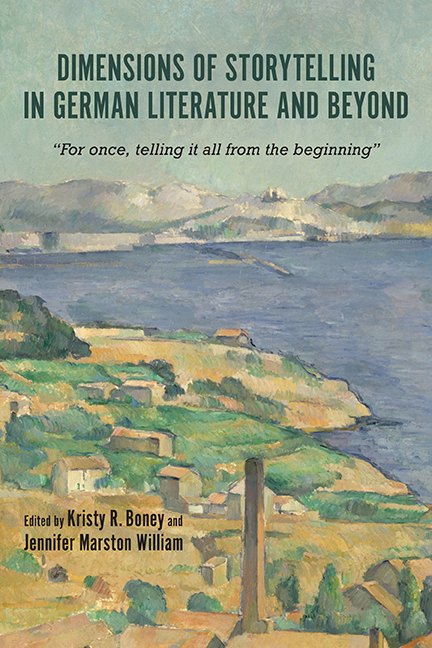 Dimensions of Storytelling in German Literature and Beyond
Dimensions of Storytelling in German Literature and Beyond Book contents
- Frontmatter
- Contents
- Acknowledgments
- Introduction: The Social, Political, and Personal Dimensions of Storytelling
- Part I Anna Seghers: A Missing Piece in the Canon of Modernist Storytellers
- Part II Expressions of Modernity: Using Storytelling Unconventionally
- Part III The Personal Narrative: Storytelling in Acute Historical Moments
- 14 Problems and Effects of Autobiographical Storytelling: Als Pimpf in Polen: Erweiterte Kinderlandverschickung 1940–1945 (1993) and A Hitler Youth in Poland: The Nazis’ Program for Evacuating Children during World War II (1998)
- 15 Too Near, Too Far: My GDR Story
- 16 Conflict without Resolution: Konrad Wolf and the Dilemma of Hatred
- 17 “Bleibt noch ein Lied zu singen”: Autobiographical and Cultural Memory in Christa Wolf's Novel Kindheitsmuster
- 18 Narrating germany's past: a story of exile and the return home—a translation of the chapter “above the lake” from ursula Krechel's Novel Landgericht
- 19 Storytelling in the GDR: An Interview with Eberhard Aurich and Christa Streiber-Aurich
- Notes on the Contributors
- Index
17 - “Bleibt noch ein Lied zu singen”: Autobiographical and Cultural Memory in Christa Wolf's Novel Kindheitsmuster
from Part III - The Personal Narrative: Storytelling in Acute Historical Moments
Published online by Cambridge University Press: 12 April 2019
- Frontmatter
- Contents
- Acknowledgments
- Introduction: The Social, Political, and Personal Dimensions of Storytelling
- Part I Anna Seghers: A Missing Piece in the Canon of Modernist Storytellers
- Part II Expressions of Modernity: Using Storytelling Unconventionally
- Part III The Personal Narrative: Storytelling in Acute Historical Moments
- 14 Problems and Effects of Autobiographical Storytelling: Als Pimpf in Polen: Erweiterte Kinderlandverschickung 1940–1945 (1993) and A Hitler Youth in Poland: The Nazis’ Program for Evacuating Children during World War II (1998)
- 15 Too Near, Too Far: My GDR Story
- 16 Conflict without Resolution: Konrad Wolf and the Dilemma of Hatred
- 17 “Bleibt noch ein Lied zu singen”: Autobiographical and Cultural Memory in Christa Wolf's Novel Kindheitsmuster
- 18 Narrating germany's past: a story of exile and the return home—a translation of the chapter “above the lake” from ursula Krechel's Novel Landgericht
- 19 Storytelling in the GDR: An Interview with Eberhard Aurich and Christa Streiber-Aurich
- Notes on the Contributors
- Index
Summary
CHRISTA WOLF's NOVEL Kindheitsmuster (Patterns of Childhood, 1976) attained and maintains canonical status of autobiographical Vergangenheitsbewältigung (mastering the Nazi past). Following its publication, psychological interpretations of Kindheitsmuster predominated, influenced by popular theories, such as those in Alexander and Margarete Mitscherlich's Die Unfähigkeit zu trauern (The Inability to Mourn, 1967) and Klaus Theweleit's Männerphantasien (Male Fantasies, 1977–78), and psychological approaches to the novel continue. After all, Wolf intensely probes the psyche of her child protagonist, Nelly, as a therapeutic process to uncover repressed memories through writing. Analyses of remembering have referred to Christa Wolf's metaphor of the “Medaillon” in her 1968 essay “Lesen und Schreiben” (Reading and Writing), which uses the analogy of the cameo to describe distorted memories that have been stylized or aestheticized. In the early 1990s Kulturwissenschaftliche Gedächtnisforschung (Memory Studies) emerged as a school of cultural studies in Germany. The tenets and methods suggest an approach to reading Kindheitsmuster that expands on the early psychological interpretations but will in the scope of the present essay remain mostly a suggestion for further development rather than a thorough and systematic analysis. Memory Studies, as they have taken shape in the last quarter-century, often question the collective German understanding and regard for the Nazi past, which had become all the more urgent in light of German reunification and the reactionary politics responding to recent waves of immigration from the Middle East and Africa. Christa Wolf's reflections on memory and the process of remembering through writing in Kindheitsmuster invite further examination with respect to current events, particularly since they correspond to concepts of communicative and cultural memory. One must keep in mind that Kindheitsmuster is a canonical work of literature, and thus itself belongs to the store of cultural memory. Moreover, Vergangenheitsbewältigung (a German word meaning coming to terms with the past) has not faded into the archive of forgotten scholarship, but rather continually evolves and expands its relevance. The present analysis concentrates on one discrete element that elucidates the processes of recollecting (and forgetting) in Wolf's novel and that has yet to be examined in detail: the mnemonic function of auditory signs and symbols through songs, which underscore the subtle power of everyday rituals to shape individual and collective memories and identities.
- Type
- Chapter
- Information
- Dimensions of Storytelling in German Literature and Beyond“For once, telling it all from the beginning”, pp. 221 - 233Publisher: Boydell & BrewerPrint publication year: 2018


